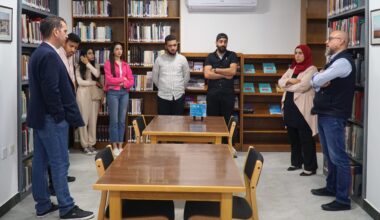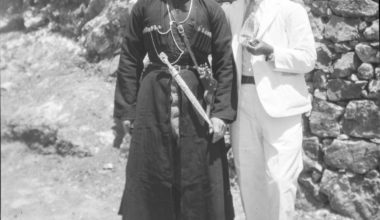By Katharina Lenner, CBRL Pilot Study grant holder and Prize Fellow at the University of Bath.
“We don’t want sheep or chicken, we just want to leave this country”, a Syrian man in his fifties said at a focus group I convened in Mafraq, Jordan in August 2017. We were there to discuss his and other refugees’ participation in a new cash for work project funded by the German government. The programme puts Syrian and Jordanian participants to work as municipal waste pickers for a few weeks or months, and then gives them micro-grants and training courses on establishing small businesses. A suggested strategy upon graduation is to buy sheep or chickens to raise and sell their products. The man at the focus group wanted none of that.
Mafraq was one of the field sites for my CBRL-funded pilot study that looked at German refugee policies and projects in Jordan. Germany has, since 2015, gone from sponsoring a limited number of projects in the water sector to Jordan’s second largest bilateral donor. The major reason for this shift, and the central focus of this expanded programme of work, are Syrian refugees. A primary goal of the German Development Ministry’s activities in Jordan is to “tackle the root causes of displacement and integrate refugees”, the title of its largest current special initiative. In this context, ‘integration’ is something that happens in countries of first reception, where the overwhelming majority of the world’s displaced live.
Paying to encourage that process, which includes supporting the economic stability of the hosting country, is part of a wider political strategy to prevent further migration to Germany, where the political environment has become markedly more hostile to refugees ever since the ‘summer of migration’ in 2015. Jordan has not been the only country in the region to receive increased levels of German aid. Yet due to its openness to donor-sponsored interventions, it has become something of a laboratory for employment-generating projects. As a result, the German government has given it far more attention and support than any other refugee-hosting country in the region.
When chickens aren’t enough
Building on a critical ethnographic approach to policy making, my fieldwork sought to understand these changing features of German refugee policy in Jordan and gauge their effects on the ground. “Cash for work” projects are central to this shift and accordingly, a primary aim of my fieldwork was to explore one such project operating in the waste sector in greater depth. I also looked at other employment-oriented projects such as a scheme to provide vocational training for men and women as plumbers. In both cases, I attempted to understand the social life of the projects and the larger structures in which they are embedded. I was particularly interested in the dynamics between and within implementing agencies, and how those dynamics affected beneficiaries.
As an Arabic speaking German having worked in Jordan for a long time, I was able to access both the German-speaking world of country representatives, project managers, and governmental partners, as well as local world of implementing staff, partner organisations and beneficiaries. My two months of fieldwork consisted of interviews, informal conversations and focus group discussions with all of the above groups. This was followed by trips to Bonn and Berlin to conduct background research on the changing dynamics of development policymaking in Germany.
Experience has taught me that the most illuminating conversations often take place during long car trips to field sites, over informal joint lunches, or when people are simply taking a break. This is when a researcher hears about the challenges that projects like these commonly contend with: how local politics holds up projects; how individual actors seek to maximise their personal benefit; how project staff are pressured to increase their metrics; how different agencies clash over approach; and how Jordanians in different positions of power relate to Syrian participants.
Such in-between moments can also shed light onto what the participants think about the programmes supposedly benefiting them. I asked them how they experienced their participation in employment-oriented measures, and how this shaped their views of their lives and their futures. The social and professional backgrounds of my interlocutors ranged from former shepherds, to teachers and company owners to housewives and schoolgirls. Their perspectives on the benefits of such employment measures were thus expected to differ. One observation, however, was surprisingly consistent: those who had worked in short-term cash for work projects had frequently felt at the mercy of others and not in control of their lives. The schemes had provided much needed cash but had not resolved a sense of precarity. Some were resigned to this. For others however, these projects counterintuitively tended to reinforce a wish to go elsewhere, such as they did to the man in Mafraq who was not willing to trust his life to some chickens or sheep.
In contrast, those associated with projects for longer durations were noticeably happier. A number of women involved in the plumbing project, for example, spoke proudly of the way their new skills had increased their standing in their families and communities, despite deriving only little income from their activities. This indicates that less might be more. Rather than trying to channel as many people as possible through short-term measures, sustained cooperation with smaller groups may be a much more powerful way of contributing to a vulnerable population’s sense of livelihood, security and wellbeing.
At the end of my fieldwork, I held a one-day workshop at CBRL Amman that brought together staff from across different German-funded projects and organisations in Jordan and added a comparative dimension through a block on livelihoods programming in Lebanon. It was a forum designed to discuss my preliminary findings and for my guests to share their experiences from a wide range of projects and contexts. After background conversations in Germany and a maternity break, I am now writing up results and feeding the fieldwork data and background conversations into a new grant application. This will focus on gendered dimensions of cash for work projects with a view to better understanding group-specific understandings of what constitutes decent work.
Katharina Lenner is a Prize Fellow at the University of Bath’s Department of Social & Policy Sciences. Her work focuses on the politics of development and social policy, the governance of migration and refugees, as well as postcolonial and anthropological perspectives on statehood and collective identities.
The views expressed by our authors on the CBRL blog are not necessarily endorsed by CBRL, but are commended as contributing to public debate.














